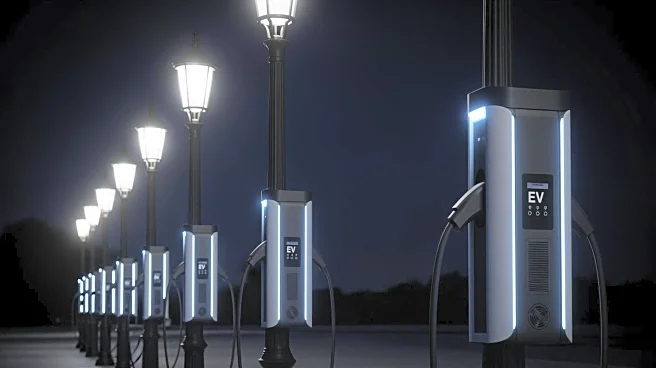What's Happening?
Voltpost, a startup founded in Brooklyn, New York, is transforming urban lampposts into electric vehicle (EV) charging stations. This initiative aims to provide convenient charging solutions for city residents,
particularly those without access to private garages. The company, which began in 2021, has expanded its operations across several states, including California and New York. Despite its growth, Voltpost faces challenges due to the Trump administration's suspension of federal grants intended for green projects. These grants were part of the Biden administration's Infrastructure Investment and Jobs Act, which allocated $7.5 billion for EV charging infrastructure. The suspension has created uncertainty for companies like Voltpost, which rely on federal support to expand their operations.
Why It's Important?
The development of accessible EV charging infrastructure is crucial for the widespread adoption of electric vehicles, which is a key component of reducing carbon emissions and combating climate change. Voltpost's innovative approach addresses the need for urban charging solutions, potentially accelerating the transition to sustainable transportation. However, the suspension of federal funding highlights the political challenges that can impede progress in the clean energy sector. The uncertainty surrounding federal support may slow down the deployment of necessary infrastructure, affecting the U.S.'s competitiveness in the global EV market, particularly against countries like China.
What's Next?
Voltpost and other clean energy companies may need to increasingly rely on private investments and partnerships with local governments to continue their expansion. The ongoing legal battles over federal funding could result in changes to the availability of grants, impacting the pace at which EV infrastructure is developed. Stakeholders in the clean energy sector will likely continue to advocate for stable and supportive policies to ensure the growth of sustainable technologies.
Beyond the Headlines
The situation underscores the broader issue of how political shifts can impact environmental initiatives. The reliance on federal funding for green projects means that changes in administration can significantly alter the landscape for clean energy companies. This highlights the need for bipartisan support and long-term policy commitments to ensure the stability and growth of the clean energy sector.








